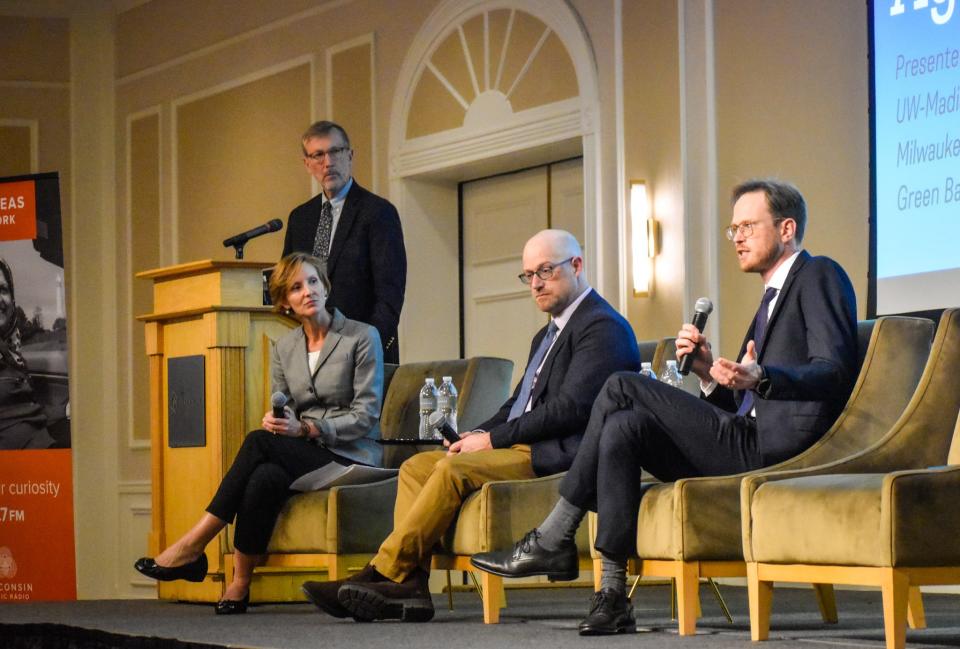Comfy chairs, warm welcomes and a call to ‘take it on the road’
As 2022 wrapped, various groups offered their annual words of the year meant to capture the zeitgeist of the past 12 months. “Goblin mode” and “gaslighting” topped two prominent lists. Mine was “comfy chair,” though I can’t take credit for the term. Still the more I think about it, comfy chairs are essential to our mission to promote civil conversations about a better Wisconsin.
The term was coined by Lisa Ellinger, the outreach director at the La Follette School of Public Affairs at the University of Wisconsin-Madison as we debriefed our first Main Street Agenda event in September. During that town hall, our panelists were crowded around a table sitting on stiff, uncomfortable plastic chairs. The set-up wasn’t exactly conducive to our goal of having relaxed conversations where people felt comfortable sitting talking about complex and often deeply held convictions about democracy, inflation or climate change.
For the three remaining events “comfy chairs” were an essential part of the program, and I think it really helped set the stage for more insightful and beneficial discussions we don’t see very often these days. Over the course of my first few weeks in this new role, it struck me that most public discourse could benefit from creating a safe environment where people can come together for spirited, civil conversations about issues that matter.

In that spirit, I’ve really appreciated the feedback from readers following my introduction column. Here are a few highlights:
From Robert: “One of the first moves to “promote civil dialogue” would be to eliminate the comments feature regarding editorials. It always descends into the snarky and name-calling. There is no value to it. It is not spirited. It is mean-spirited. They are not being monitored efficiently.”
Comments have been vexing – to put it nicely -- since the earliest days of digital. So much promise, so much trash. Constructive criticism and feedback are healthy, even necessary. The latest commenting feature on our website was designed to encourage healthy discussion and attempt limit the worst excesses, but as you point out, often only advances the argument that otherwise polite and smart people turn into something far different behind a keyboard and a semi-anonymous screen name.
From Tom: “I absolutely believe that your chosen words reflect a sincere understanding and ambition, aspiration too. The distinction that I will learn from your work is, if your vocabulary has been formed from revised definitions and principles. If your decisions reflect a firm commitment to liberal principles, then as a conservative I welcome that basis and anticipate a much-needed open choice of points of view and sound sourcing. If however your grounding is of the overweighted approach and of re-defined principles, then my reading of articles will resume the mostly glanced-over case of low value I've become sadly left with.”
Nothing I personally believe has ever fit into a tidy basket that aligns with today’s political parties or clumsy partisan labels. Honestly, I think most people are exhausted and sick of the blue, red and purple state descriptions. The goal of the Ideas Lab is to present a wide-range of perspectives grounded in facts that offer solutions and bring new voices to the table – hopefully nothing of low-value or glance-over status.
From Michael on freedom of the press and our national and Wisconsin Impact reports to readers: “I encourage the Journal Sentinel and others who are concerned about protecting this vital right to ‘take it on the road.’ Using physical copies of the Impact Reports where possible, speak to groups whose members may not be newspaper readers. Protecting freedom of the press concerns us all.”
More:Here's how the USA TODAY NETWORK-Wisconsin had an impact on its communities in 2022
Great advice. Freedom of speech and freedom of the press are rights fundamental to understanding and protecting our other rights. On this count, I don’t think it makes someone liberal, conservative or anything but an American. Thanks for the feedback and look forward to the next batch.
Contact Jim Fitzhenry at (920) 993-7154 or jfitzhen@gannett.com. Follow on Twitter at @JimFitzhenry, Instagram at @jimfitzhenry or LinkedIn.
This article originally appeared on Milwaukee Journal Sentinel: The key to improving political discussions might be as sample as comfy chairs.

